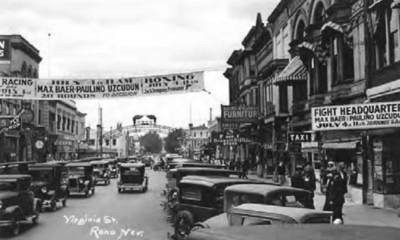Featured Articles
Christmas Day in Germany With Sugar Ray Robinson

A TSS CLASSIC – It was snowing when Sugar Ray Robinson and his entourage left their hotel in Frankfurt, Germany, for the short walk to the sterile brick building where Robinson would display his wares. This wasn’t the soft snow that flutters from the sky to delight young children on Christmas morning; this was a driving snow, the kind that stings when it hits you in the face. No man should be out in this weather on Christmas but here was Sugar Ray Robinson on Christmas Day, 1950, going to work in a land far from home.
Robinson’s work was giving and receiving punches inside a small roped enclosure. He was a lot better at the former than the latter, capable of firing off a fusillade of punches before his opponent, if still standing, could answer with a punch of his own. But this was still a hard way to earn a living.
Robinson’s trip to Frankfurt was the final leg of a whirlwind European tour, five fights in 29 days beginning with an engagement in Paris on Nov. 27. In design, the tour replicated many of the tours arranged for America’s great black jazz musicians who found a more appreciative audience in Europe than in their home country. From Paris, Sugar Ray went to Brussels and Geneva and then returned to Paris for a match with Robert Villemain.
Robinson’s welterweight title wasn’t at risk in any of these five fights. He had given notice that he planned to vacate it. But these were not exhibitions. To the contrary, Robinson was matched against some of the top fighters in Europe. Villemain, a rugged fighter built along the lines of Marcel Cerdan, which is to say stocky, was Exhibit A.
They had met earlier that year in Philadelphia. The fight went 15 rounds with Robinson coming out on top. Prior to his first encounter with Robinson, Villemain had split two bouts with Jake LaMotta, avenging an awful decision from their first meeting, and scored a win over future Hall of Famer Kid Gavilan, the Cuban Hawk.
It has been noted that one of the hallmarks of great champions is that they invariably elevate their game in rematches. Fighting before a hostile crowd at the Palais des Sport, Robinson didn’t leave the sequel in the hands of the judges. He battered Villemain to the canvas in the ninth round and although the Frenchman beat the count, he was too badly hurt to continue in the eyes of the ref who waived the fight off.
After opposing a man of Villemain’s stature, Robinson was entitled to a nice long rest. But before news of his victory hit the next day’s papers, he and his entourage were on board a red-eye train to Frankfurt, a 12-hour trip.
Robinson was famous for his entourage. On this excursion it consisted of his manager, George Gainford, his wife, his chief second, his barber, his golf pro, two secretaries and a late addition, a dwarf he picked up in Paris who was useful to him as a translator. When the crew was together as a unit they all wore matching purple jackets, Robinson’s favorite color. In Europe, they could not have been more conspicuous if they were aliens from outer space.
It didn’t take long for sportswriters to anoint Sugar Ray Robinson the best boxer, pound-for-pound, in the modern (i.e. Queensberry) era of prizefighting. As an amateur he was 89-0. His pro record entering his second bout with Villemain was 119-1-2. The lone defeat had come in his second meeting with Jake LaMotta, a bout in which he was outweighed by 16 pounds, and he had avenged that loss thrice in what would ultimately be a six-fight series.
But forget the numbers. A fighter’s won-loss record is pretty much a useless statistic, albeit that was far less true in Robinson’s day. What was remarkable is that the most lavish bouquets lavished on him came from the senior members of the sportswriting fraternity.
Old-time fight fans are notorious for thinking that old-time fighters were superior to their modern counterparts and old sportswriters aren’t immune. Some wizened scribe was bound to have offered up this opinion: “Okay, I’ll grant you, this kid Robinson is pretty good, but if he had met Mickey Walker in Walker’s prime he would have been in for a rude awakening.” But no one offered up that caveat, at least no one to this reporter’s knowledge, and this reporter has spent countless hours rummaging through old newspapers. The lionization of Sugar Ray Robinson was unanimous.
In Frankfurt, Robinson was matched against Hans Stretz whose record was said to be 33-3. Seven years younger than Robinson at age 22, Stretz was a former and future German middleweight champion.
Stretz was refreshingly realistic when assessing his chances. “Anything can happen in boxing,” he said. “The worst sometimes beat the best and I’m not the worst.” But Stretz knew something that Robinson didn’t. He knew that the building that would house their fight, the Haus de Technik, a building built for industrial trade shows, was unheated and in hopes of getting an edge he prepared for Robinson in an unheated gym.
The patrons, reportedly 7,000, arrived wearing heavy jackets. Between rounds they stood and stamped their feet in unison on the concrete floor as a means of abating the chill.
Robinson knocked Stretz to the mat within the first 30 seconds of the fight. The German dusted himself off and had some good moments in rounds two and three, but that merely prolonged the inevitable. He would be knocked down eight times in all before the match was halted in the fifth round. The final punch was a straight left. Stretz wasn’t concussed but he was exhausted and made no attempt to rise as the referee tolled the “10” count.
Again there was no rest for the weary. Two days later, on Dec. 27, the ocean liner SS Liberte left Paris for New York. Robinson and his entourage, minus the dwarf, were on it.
It was important for Robinson to get home in a hurry. He would have only six weeks to get ready for his next fight and this was a biggie, a match with Jake LaMotta, the man who had given him his toughest fights. At stake would be LaMotta’s middleweight title, affording Sugar Ray an opportunity to win a world title in a second weight class. Before that, on Jan. 9, 1951, there was the annual dinner of the Boxing Writers Association of America where Robinson was set to receive the Edward J. Neill Memorial Award forged to honor “the person who has done the most for boxing during the preceding year.” (Neill was an Associated Press war correspondent who died from a shrapnel wound while embedded with the Loyalists in the Spanish Civil War.)
Sugar Ray was a worthy honoree. In Europe, by virtue of his fistic brilliance, he brightened the day of many people still suffering from the ravages of World War II. And how odd that his trip to Europe would include a stop-over in Germany, America’s arch-enemy just a few years earlier.
German fight fans aren’t as animated as fight fans in other countries, but I have no doubt that most of them watching the Robinson-Stretz fight with no apparent emotional allegiance were sorely disappointed that Hans Stretz didn’t make a better showing. Boxing, more than any other sport, feeds on tribal loyalties. But they left knowing that they had seen a master craftsman at work. “[Sugar Ray Robinson] is perhaps the closest thing to a perfect fighting machine the human race will ever produce,” wrote Bill Zalenski, the ringside correspondent for Stars and Stripes.
—-
I don’t want to get maudlin here. Robinson’s excursion to Europe was all about making money to maintain his ostentatious lifestyle. But I have thought about the Robinson-Stretz fight a lot and there’s a part of me that wants to think that he was drawn to Frankfurt by a force more powerful than a felt need for pecuniary enrichment.
The crowd included a smattering of American GIs. A few years earlier, they would have been in Germany on a killing mission. A little over five years had elapsed since the war in Europe had officially ended with the signing of the Armistice. Measured by the sands of time, that was yesterday. And yet here in an unheated building in wintry Frankfurt, with wounds still fresh from the deadliest conflict in human history, Americans and Germans had come in peace to watch a recital by the most skilled practitioner of the so-called manly art.
How appropriate that this scene played out on Christmas.
Editor’s note: This story was first published on Dec. 24, 2018.
-

 Featured Articles3 weeks ago
Featured Articles3 weeks agoAvila Perspective, Chap. 330: Matchroom in New York plus the Latest on Canelo-Crawford
-

 Featured Articles2 weeks ago
Featured Articles2 weeks agoVito Mielnicki Jr Whitewashes Kamil Gardzielik Before the Home Folks in Newark
-

 Featured Articles4 weeks ago
Featured Articles4 weeks agoOpetaia and Nakatani Crush Overmatched Foes, Capping Off a Wild Boxing Weekend
-

 Featured Articles3 weeks ago
Featured Articles3 weeks agoCatching Up with Clay Moyle Who Talks About His Massive Collection of Boxing Books
-

 Featured Articles4 weeks ago
Featured Articles4 weeks agoFabio Wardley Comes from Behind to KO Justis Huni
-

 Featured Articles2 weeks ago
Featured Articles2 weeks agoMore Medals for Hawaii’s Patricio Family at the USA Boxing Summer Festival
-

 Featured Articles3 weeks ago
Featured Articles3 weeks agoThe Shafting of Blair “The Flair” Cobbs, a Familiar Thread in the Cruelest Sport
-

 Featured Articles3 weeks ago
Featured Articles3 weeks agoRichardson Hitchins Batters and Stops George Kambosos at Madison Square Garden






















